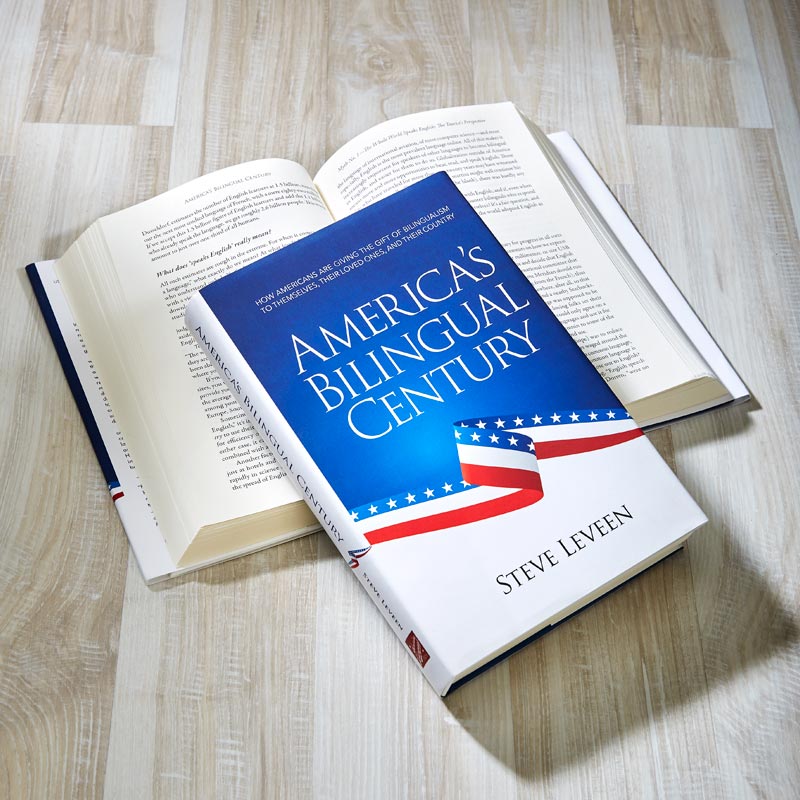Since retiring from Levenger in 2015 I’ve been working my second act, or encore career as it is sometimes called, but never would I have guessed during my time at Levenger what this second act would be.
The transition began in my 50s, from an unlikely starting point: I started studying Spanish. When friends and strangers found out that I was going loco, they shared their opinions forcefully. Like, “Why bother? The whole world speaks English!” “Why bother? Technology will do it for us.” Or, “Americans suck at languages, but boy, those Europeans, they all speak three or four languages….”
You may have heard similar things.
I got intrigued that my fellow Americans had such strong views, which seemed at odds with the growing presence of Spanish and other non-English languages in America. I sensed that maybe our views hadn’t kept up with what was truly going on in the country.
I started reading about the demographic changes in America and our country’s growing bilingualism. I learned that there have been, in fact, big changes in our country in recent decades, changes that are largely positive and quite important. And they challenge long-standing views we Americans have about our American languagescape.
Going forward meant, for me, going back
to my very first career.
It was then that I felt a strong pull to return to my very first career, which I pursued right out of grad school and before my wife and I founded Levenger: my work as a science writer. I wanted to study these demographic and sociological changes in America, and write about them for thoughtful, engaged readers—which of course included Levenger customers.
First stop on my second act was a year-long fellowship at Harvard in a program designed to help people launch their second acts. Then another year at Stanford in a similar program, all the while interviewing scholars, linguists and historians, plus hundreds of American bilinguals and monolinguals.

This led to founding the America the Bilingual Project, which I launched with the help of some former Levenger staffers and other friends. I wrote a book, we launched a podcast, and I now go around speaking to most any group that asks about the new and surprising linguistic renaissance here in America, why it’s important, and how everyone can be a part of it.
I sense we’re at a tipping point.
America is like a superhero who hasn’t yet discovered
her superpowers, let alone how to channel them.
Although the country is in the early stages of recognizing these changes, I sense we’re at a tipping point. America is like a superhero who hasn’t yet discovered her superpowers, let alone how to channel them.

Our latest gambit for spreading this new understanding of our linguistic awakening is the Quizzery, a page on the America the Bilingual website where we post our original quizzes. Our very first quiz features 10 questions on how America’s linguistic landscape compares with other parts of the world.
You’ll find questions like:
- Which country has the highest percentage of immigrants–Canada, Germany, or the US?
- When you compare the number of bilingual speakers in the US with the number in France, does the US have: a lot fewer, a lot more, or about the same?
The real reason we’re creating these quizzes is not to see how many questions you can answer correctly (but bien hecho—well done—for those you do). Our purpose is to find an entertaining way to share some data that is surprising and important.
The real reason we’re creating these quizzes is to share
some data that is surprising and important.
More than merely data points accompany each answer, so that you’ll gain background and context, along with sources. It’s reporting wrapped into a quiz.
It makes no difference whether you’re bilingual or even wish to be. My primary motive is to share information with you that will play a part in the future direction of the country, and soon. And I’m pretty sure that you’re not likely to find this information anywhere else.
Since I have a founder’s love for Levenger, I wish this quiz required nice paper and pencils, like maybe the cool Blackwing pencils we sell. Alas, it’s all online. But I have to say that with my own daily language learning, True Writer pens and Circa notebooks are my essential tools.
Okay, shameless commerce plug over. I now invite you to try your digital hand at this unique quiz.
By the way, the first to take it were members of the language faculty at the University of Chicago, where I had the pleasure of speaking. They found it engaging. I hope you will, too.
As for the answers to those two questions I began with? Click on the quiz link now, and you’ll soon know not just the answers, but how they came to be.
Let me know how it lands on you. I’d love to hear what you think.
All best,

Steve Leveen
Co-Founder, Levenger
Founder, America the Bilingual Project
P.S. You can reply straight to my inbox at Steve@americathebilingual.com.








